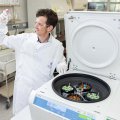A framework to help Natural Resource Management (NRM) groups build resilience in rural and regional communities has been developed by a team from The University of Queensland (UQ).
Professor Helen Ross, from UQ’s School of Agriculture and Food Sciences, says NRM groups are well positioned to help communities thrive alongside improving their environments, and to also improve their capacities to deal with and adapt to major changes such as industry deregulations, economic downturns and natural disasters.
“Although NRM groups are focused on environmental management, our research has found areas where they can help create stronger and more resilient communities,” Professor Ross said.
“We studied six communities in northern Queensland that had undergone major changes to identify what helped them to recover and adapt.
“This included examining how the Atherton Tablelands community recovered from dairy deregulation and how the Crown of Thorns starfish outbreak impacted on the Cairns coastal community.”
Professor Ross’s team identified six key factors that help communities to be resilient:
• People-place connections;
• Knowledge, skills and learning;
• Community networks;
• Engaged governance;
• A diverse and innovative economy; and
• Community infrastructure.
Past research has also shown leadership and positive outlooks to help.
“Regional bodies for natural resource management have a special opportunity to build community resilience and make it part of their working agenda by enhancing these attributes,” Professor Ross said.
“For example, encouraging the development of a diverse and innovative economy ensures that if one industry has a major downturn there are still opportunities in other areas.
“We do not envisage regional managers working towards community resilience as a separate issue, but encourage them to think of it in terms of managing the entire social-ecological system in ways that strengthen the environment and the people.”
Professor Ross will be presenting the team’s findings at the 2012 Queensland State Landcare Conference in Brisbane tomorrow (30 June).
Also speaking at the conference is UQ’s Professor of Food Security, Michael D’Occhio, and Associate Professor of Rural Development, Jim Cavaye.
Professor D’Occhio will discuss the need for ethical and sustainable food production systems that have a positive impact on ecosystems, including biodiversity.
Associate Professor Jim Cavaye will discuss practical approaches to engagement in rural and regional communities and how community organisations can attract and retain volunteers.
The conference is being held 28-30 June 2012 at the Brisbane Convention and Exhibition Centre. For information on the conference see http://qldlandcareconference.org.au
Media contact: Kathy Grube, UQ School of Agriculture and Food Sciences, 0418 524 297.



